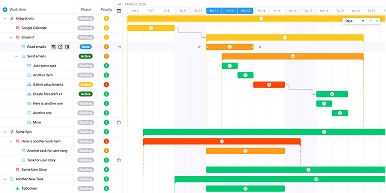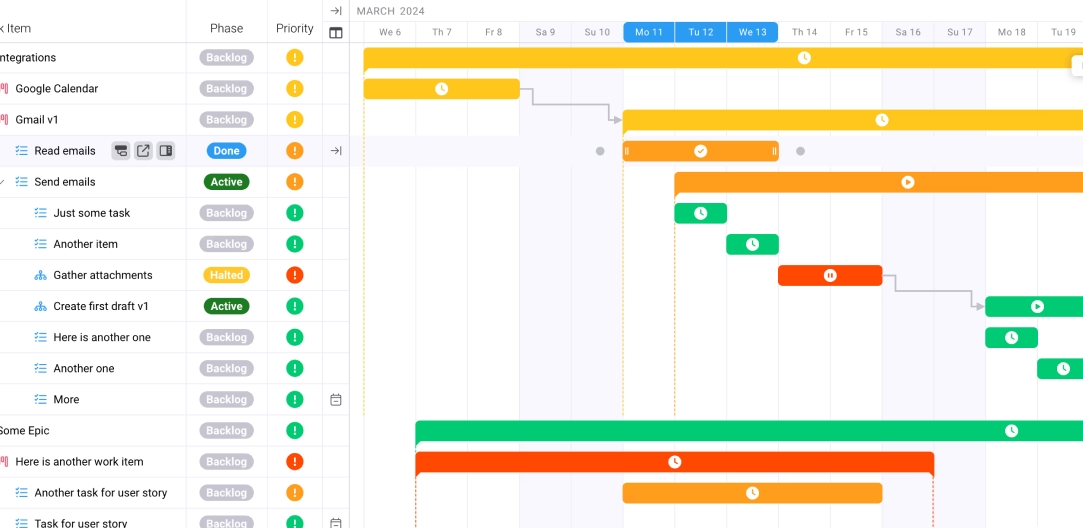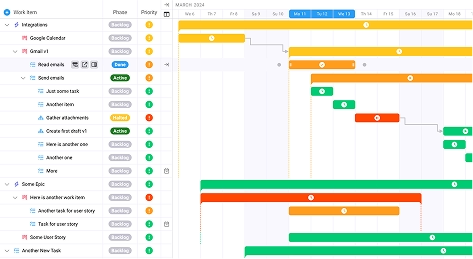
Best Project Management Software with Invoicing: A Complete Guide
Key takeaways:
The modern business landscape demands more than just task tracking and team coordination. Organizations need integrated solutions that seamlessly bridge project execution with financial management. The global project management software market is projected to reach USD 20.20 billion by 2030, driven largely by businesses seeking unified platforms that combine project oversight with billing automation.
Professional services firms face a critical challenge: project managers often struggle with billing delays due to disconnected systems. The solution lies in project management software with invoicing capabilities that eliminates data silos between project execution and financial management.
This comprehensive guide examines the best project management software with invoicing features, focusing on solutions that deliver both operational efficiency and financial accuracy for modern businesses.
The Evolution of Integrated Project Management Solutions
Traditional project management approaches often compartmentalize project execution and financial management, creating inefficiencies that directly impact profitability. Organizations run an average of 976 applications, yet only 28% are meaningfully integrated, creating data flow bottlenecks that particularly affect project-to-billing workflows.
The emergence of integrated platforms addresses these challenges by combining project oversight, resource management, time tracking, and automated invoicing in unified ecosystems. This approach eliminates manual data transfers, reduces billing errors, and accelerates cash flow cycles that are essential for business sustainability.
Modern project management software with invoicing capabilities serves multiple organizational functions:
Operational Efficiency: Streamlined workflows reduce administrative overhead while maintaining project visibility and control.
Financial Accuracy: Automated time capture and expense tracking ensure complete billing coverage with minimal manual intervention.
Cash Flow Optimization: Faster billing cycles and integrated payment processing accelerate revenue recognition and improve working capital management.
Client Transparency: Real-time project dashboards and detailed invoicing provide clients with clear visibility into project progress and associated costs.
Essential Features for Project Management and Invoicing Integration
Selecting effective project management software with invoicing requires understanding the critical features that enable seamless project-to-payment workflows:
Time Tracking and Expense Management
Comprehensive time tracking forms the foundation of accurate project billing. Leading platforms capture billable hours automatically, categorize time entries by project and task, and integrate expense logging for complete cost accounting.
Automated Invoice Generation
Advanced invoicing automation converts tracked time and recorded expenses into professional invoices with minimal manual input. This includes support for various billing models including hourly rates, fixed-fee projects, and milestone-based payments.
Resource Planning and Allocation
Effective resource management ensures optimal team utilization while providing accurate cost forecasting for project budgets and client estimates.
Client Collaboration Tools
Integrated client portals enable stakeholder access to project progress, deliverables, and billing information, improving transparency and reducing administrative communications.
Financial Reporting and Analytics
Comprehensive reporting capabilities provide insights into project profitability, team utilization, and cash flow patterns essential for business decision-making.
Top 5 Project Management Software Solutions with Invoicing
1. Ravetree: Comprehensive Professional Services Automation
Ravetree positions itself as a complete professional services automation platform, specifically designed for agencies, consultancies, and client-focused organizations. Ravetree eliminates the need for multiple software subscriptions by combining project management, CRM, and billing functionality, providing complete visibility into project profitability.
Key Strengths:
- Integrated billing capabilities built directly into the platform
- Advanced client portal functionality for transparent project collaboration
- Comprehensive resource management with real-time capacity planning
- Automated invoice generation from tracked time and expenses
- Multi-tiered file approval workflows with client participation
Ideal Use Cases: Marketing agencies, consulting firms, creative studios, and professional services organizations that require end-to-end project lifecycle management with integrated financial operations.
Pricing: Plans start at $29 per user per month, positioning it as a mid-market solution for growing organizations.
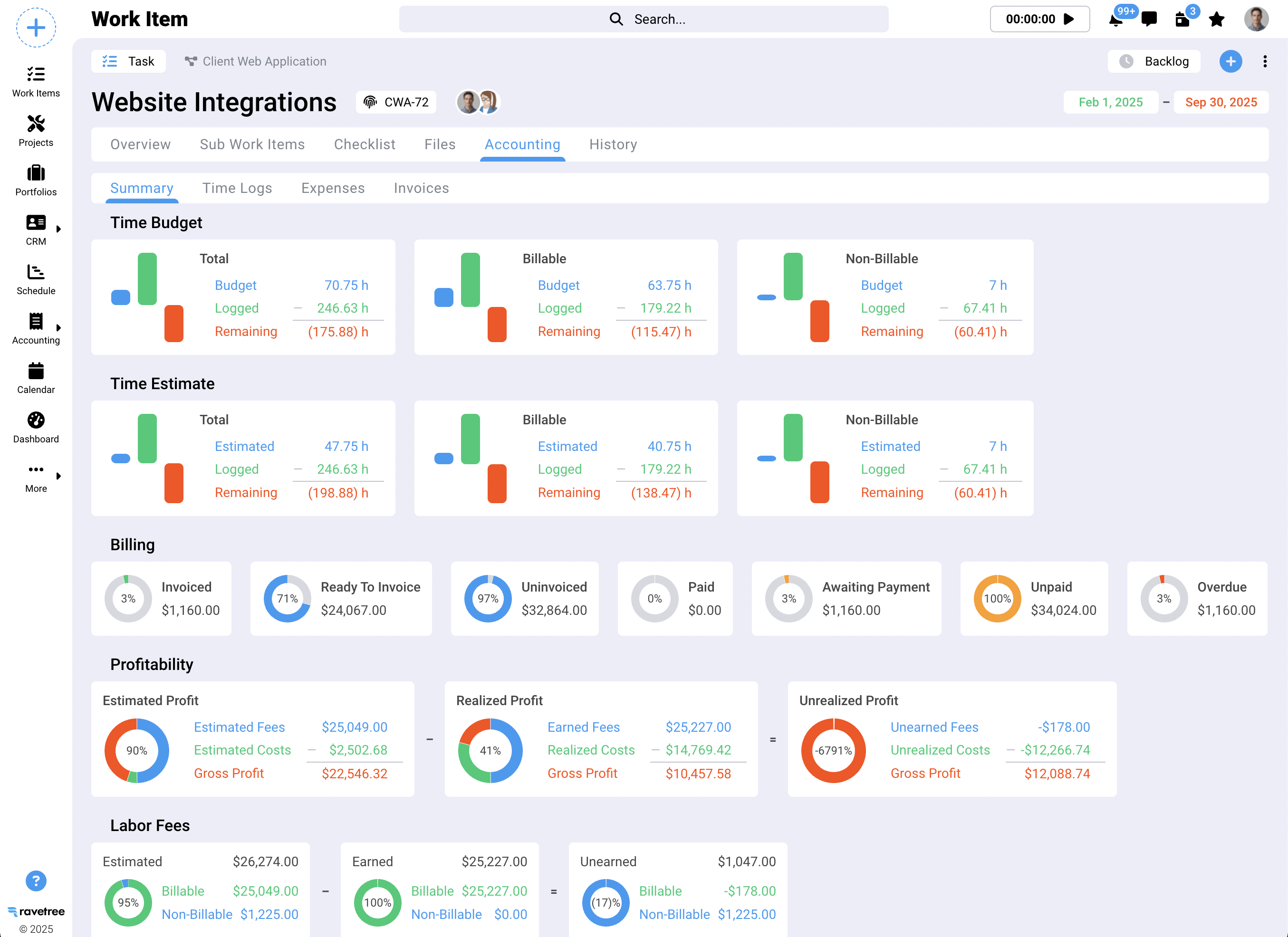
2. Harvest: Streamlined Time Tracking and Invoicing
Harvest includes intuitive time tracking and automated invoicing designed for simplicity and effectiveness. The platform focuses on core functionalities that matter most for project-based billing.
Key Strengths:
- One-click invoice generation from tracked time entries
- Seamless integration with QuickBooks and Xero accounting platforms
- Mobile-first design enabling time tracking across all devices
- Built-in payment processing through Stripe integration
- Detailed project and team utilization reporting
Ideal Use Cases: Freelancers, small teams, and organizations prioritizing simplicity in time tracking and billing workflows.
Pricing: Free plan available for individual users with two projects. Professional plans start at $10.80 per user per month.
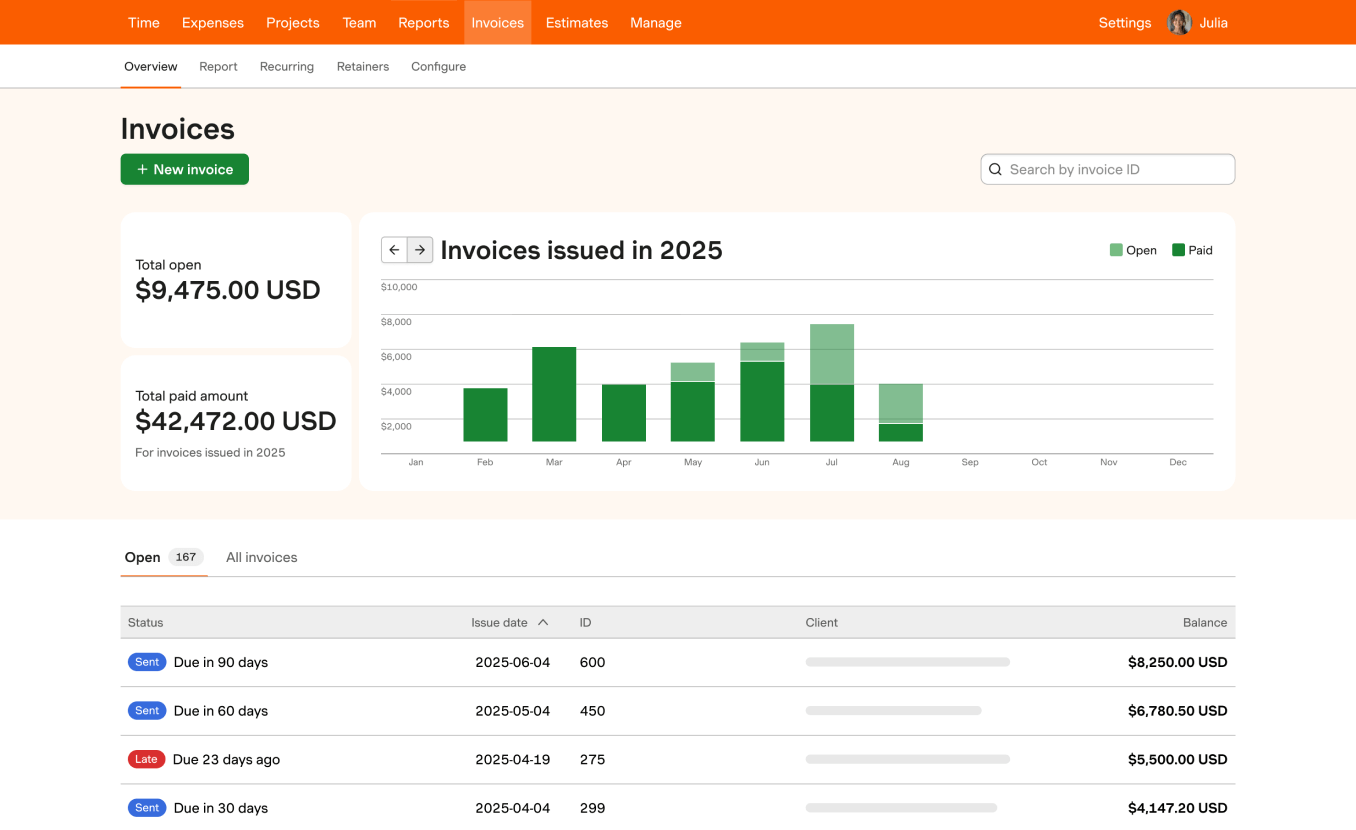
3. Scoro: Enterprise-Grade Professional Services Management
Scoro provides comprehensive work management software designed for professional services, offering extensive features for managing processes and improving operational efficiency across larger organizations.
Key Strengths:
- Multi-currency support for global operations
- Advanced project budgeting and cost tracking capabilities
- Automated recurring billing and retainer management
- Comprehensive CRM integration with project management
- Detailed financial reporting and profitability analysis
Ideal Use Cases: Larger professional services firms, agencies operating globally, and organizations requiring sophisticated financial management alongside project execution.
Pricing: Plans range from $28 to $71 per user per month, with a minimum of 5 users required.
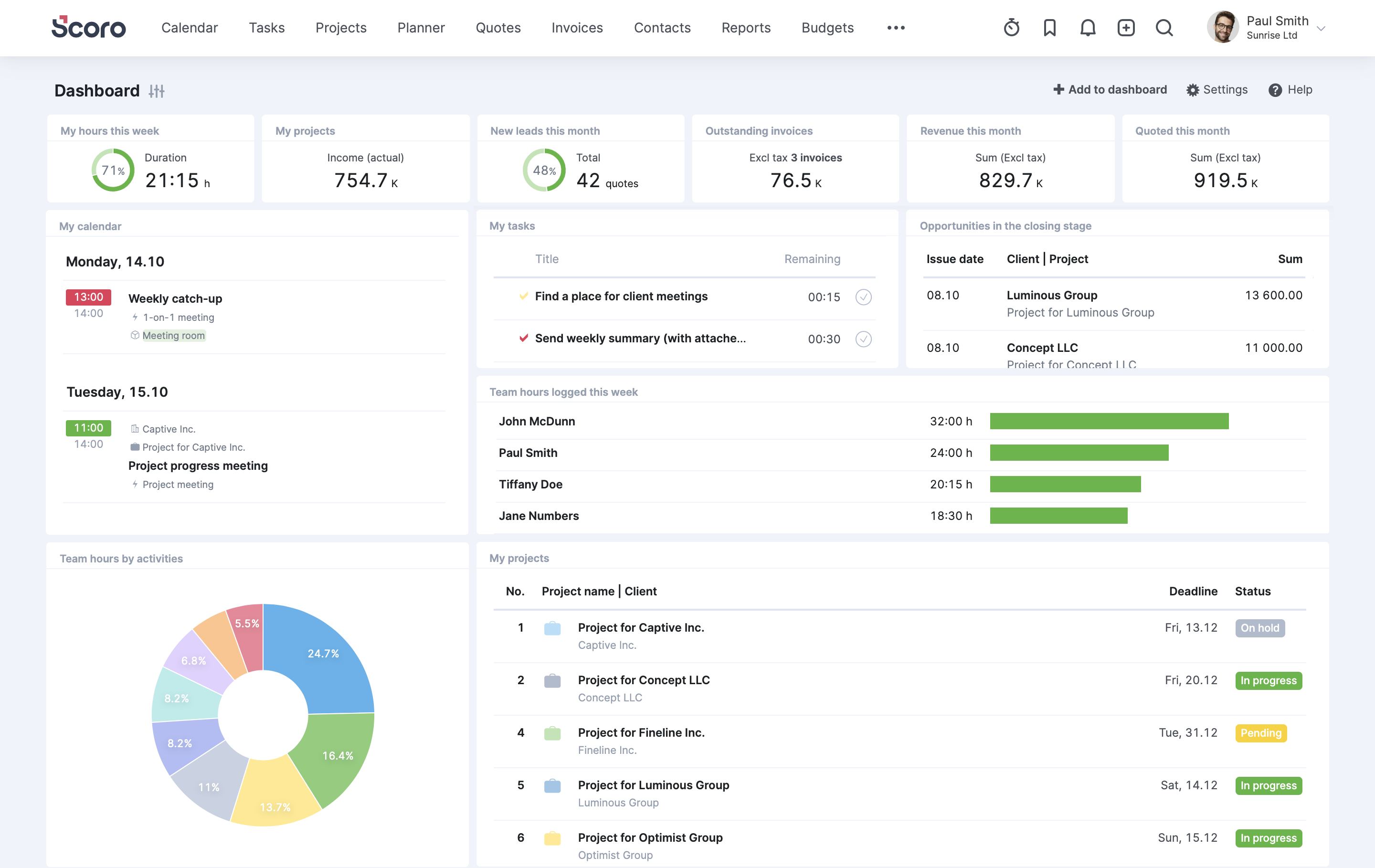
Harvest project management tool
4. Kantata: Advanced Professional Services Automation
Kantata Professional Services Automation solution combines resource management, financial management, and project coordination in a comprehensive platform designed for complex professional services operations.
Key Strengths:
- Advanced resource optimization using operations management science
- Real-time project financial tracking and margin protection
- Flexible billing options supporting various project structures
- Integration with existing accounting and CRM systems
- Comprehensive project portfolio management capabilities
Ideal Use Cases: Large consulting firms, IT services organizations, and enterprises requiring advanced resource optimization and financial management.
Pricing: Enterprise-focused pricing typically ranges from $50-$110 per user based on configuration, with a 50-user minimum.
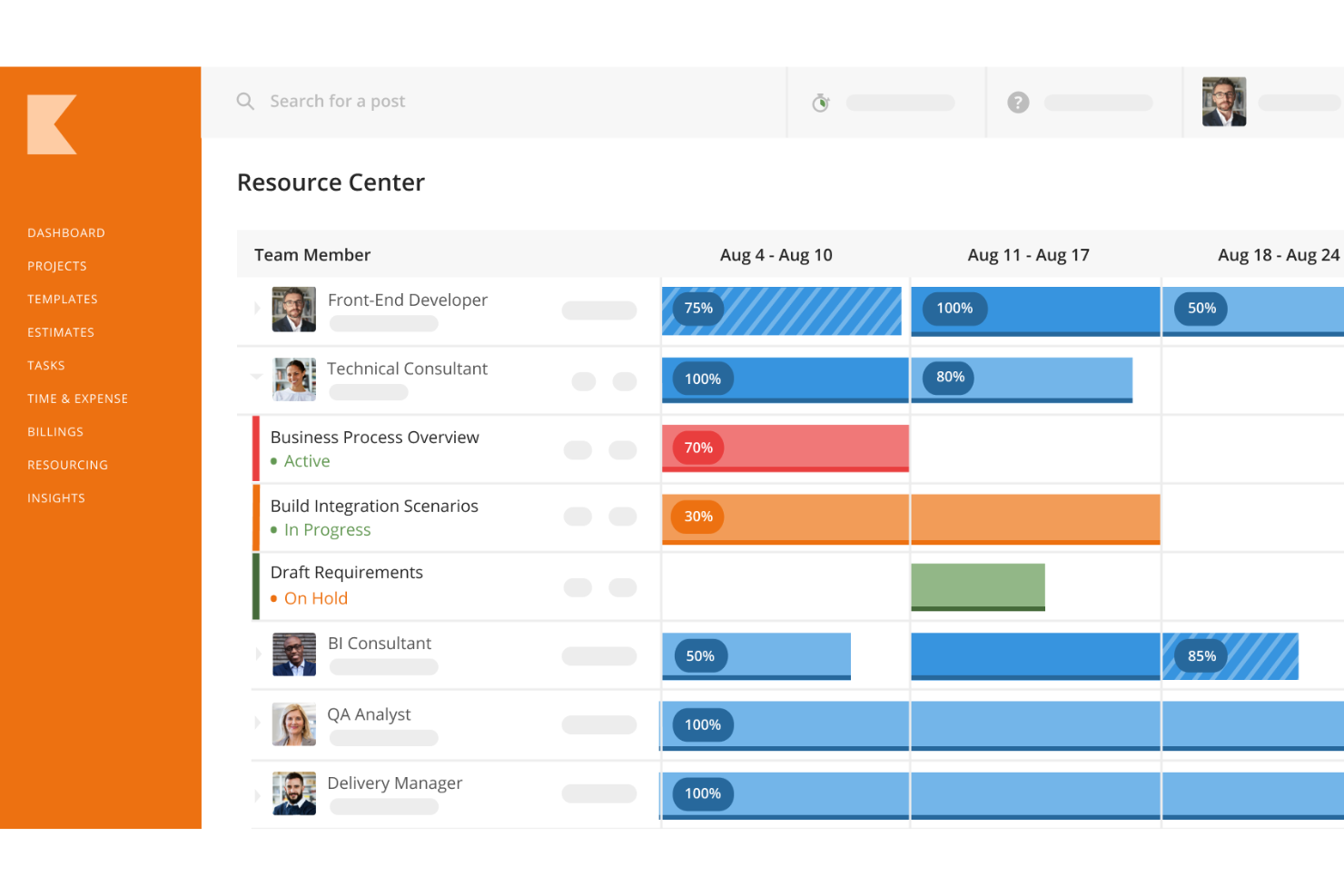
5. Wrike: Versatile Project Management with Integrated Billing
Wrike combines robust project management capabilities with invoicing functionality, offering flexibility for diverse project types and organizational structures.
Key Strengths:
- Customizable project templates and workflows
- Time tracking integration with automated invoice creation
- Advanced Gantt chart functionality for complex project scheduling
- Integration capabilities with 400+ business applications
- Scalable platform suitable for teams of all sizes
Ideal Use Cases: Organizations requiring high customization flexibility, teams managing complex project dependencies, and businesses needing extensive integration capabilities.
Pricing: Plans start with free options for small teams, with paid plans beginning around $9.80 per user per month.

Industry-Specific Considerations
Creative Agencies and Marketing Firms
Creative organizations require project management software with invoicing that supports iterative workflows, client collaboration, and detailed time tracking for campaign development. Solutions like Ravetree and Scoro provide specialized features for creative project lifecycle management.
IT Services and Consulting
Technology consulting firms need advanced resource planning, skill-based allocation, and complex billing structures. Kantata and Wrike offer sophisticated capabilities for managing technical project delivery alongside financial operations.
Professional Services Firms
Legal, accounting, and business consulting organizations require comprehensive audit trails, detailed time tracking, and flexible billing models. Platforms like Scoro and Harvest provide the financial controls necessary for professional services compliance.
Implementation Best Practices
Data Migration and Integration Planning
Successful implementation requires careful planning for data migration from existing systems and integration with current business applications. Firms that deploy comprehensive integration strategies report 30% productivity lifts.
Team Training and Change Management
User adoption represents a critical success factor for project management software implementation. Organizations should invest in comprehensive training programs and establish clear workflows that encourage consistent platform usage.
Workflow Customization
Each organization operates with unique processes that require platform customization. Effective implementations adapt software capabilities to existing business workflows rather than forcing process changes to match software limitations.
Measuring Success and ROI
Key Performance Indicators
Organizations should track specific metrics to measure the effectiveness of integrated project management and invoicing solutions:
- Time from project completion to invoice generation
- Billing accuracy and dispute reduction rates
- Team utilization and capacity optimization
- Client satisfaction with project transparency
- Cash flow improvement and payment acceleration
Financial Impact Assessment
The project management software market growth reflects increasing recognition of productivity benefits, with organizations typically seeing ROI through reduced administrative overhead, improved billing accuracy, and accelerated payment cycles.
Future Trends and Considerations
Remote Work Adaptation
Many companies use work and project management software to drive organizational efficiencies as remote and hybrid work models require enhanced digital collaboration capabilities.
Industry-Specific Solutions
The trend toward specialized solutions for specific industries continues, with platforms developing features tailored to unique regulatory requirements, billing structures, and workflow patterns.
Conclusion
Selecting the best project management software with invoicing requires careful evaluation of organizational needs, existing workflows, and growth objectives. The five solutions examined—Ravetree, Harvest, Scoro, Kantata, and Wrike—each offer distinct advantages for different organizational profiles and use cases.
Ravetree provides comprehensive professional services automation ideal for agencies and consultancies seeking complete project-to-payment integration. Harvest offers streamlined simplicity perfect for smaller teams prioritizing ease of use. Scoro delivers enterprise-grade capabilities for global operations requiring sophisticated financial management. Kantata focuses on advanced resource optimization for large consulting organizations. Wrike provides versatile customization for diverse project management needs.
Success with project management software with invoicing depends not only on platform capabilities but also on thoughtful implementation, comprehensive training, and ongoing optimization of workflows to maximize both operational efficiency and financial performance. Organizations that integrate these solutions effectively position themselves for sustainable growth in increasingly competitive markets.
The future of project management software with invoicing lies in continued automation, enhanced integration capabilities, and specialized features that address the unique challenges facing professional services organizations in 2026 and beyond.
Frequently Asked Questions
What are the key benefits of integrated project management and invoicing software?
Integrated solutions eliminate data silos between project execution and billing, reducing administrative overhead, improving billing accuracy, and accelerating cash flow through automated invoice generation and payment processing.
How do I choose between cloud-based and on-premise project management software?
Cloud-based solutions offer scalability, automatic updates, and remote access capabilities, while on-premise solutions provide greater data control and customization options. Most organizations in 2026 prefer cloud-based platforms for their flexibility and lower maintenance requirements.
What integration capabilities should I prioritize when selecting project management software with invoicing?
Focus on integrations with your existing accounting software (QuickBooks, Xero), CRM systems, and communication tools. API availability enables custom integrations for specialized business requirements.
How can project management software with invoicing improve client relationships?
Transparent client portals provide real-time project visibility, automated progress updates, and clear billing documentation, reducing client communications overhead while improving trust and satisfaction.
What should I expect during the implementation process?
Plan for 4-8 weeks for full implementation, including data migration, team training, and workflow customization. Success depends on comprehensive change management and ongoing optimization of platform usage.
How do I measure ROI from project management software with invoicing?
Track metrics including billing cycle time reduction, administrative time savings, billing accuracy improvements, and client satisfaction scores. Most organizations see positive ROI within 6-12 months through operational efficiency gains.


